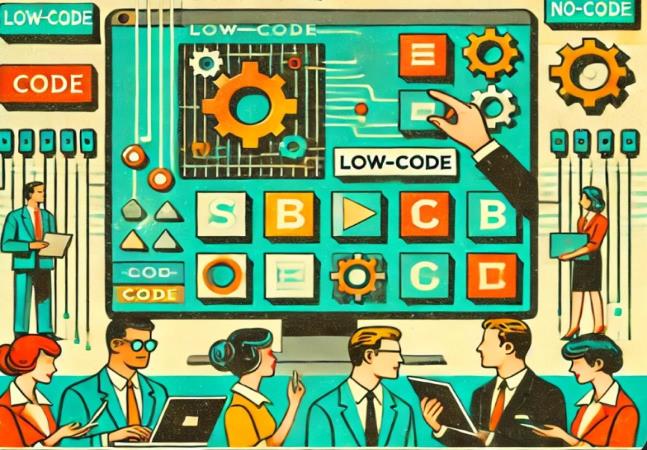
Microsoft plans to let more of its users spin up autonomous AI agents within Copilot Studio, its AI orchestration platform.

OutSystems, provider of a high-performance, low-code development platform, has introduced what it is calling the industry's first AI-powered digital worker for the full software development life cycle (SDLC).

Hugging Face announces the launch of Gradio 5, the latest version of its open-source platform for building machine learning (ML) applications. This new release brings a range of features aimed at broadening access to AI, including an innovative AI-powered app creation tool, improved web development functionalities, and strengthened security measures.

OpenAI introduces the public beta of its Realtime API, offering developers a tool to integrate natural, low-latency, multimodal interactions into their applications. Now available to all paid developers, this API facilitates real-time speech-to-speech conversations with minimal delay, providing a smoother and more engaging user experience, according to the company.

OpenAI introduces new tools for developers, enhancing its AI capabilities with multimodal fine-tuning options for its GPT models.

Identity platform provider Stytch launches new device fingerprinting capabilities designed to provide enhanced fraud and bot protection for developers. The upgrade incorporates advanced AI functionality, offering an easy-to-integrate solution for boosting security within authentication flows, the company said. Stytch’s technology aims to provide seamless and highly accurate bot detection, reducing user friction and enhancing security without visible interventions.

JFrog has introduced a new runtime security solution aimed at enhancing software integrity and streamlining collaboration between developers and security teams. The addition of JFrog Runtime to the company’s existing security tools is meant to empower enterprises to embed security at every stage of the software development process, the company said, from writing source code to deploying applications in production.

Hewlett Packard Enterprise (HPE) announces the launch of HPE Private Cloud AI, a platform designed to streamline the deployment of GenAI applications for businesses of all sizes. Developed in collaboration with NVIDIA as part of the "NVIDIA AI Computing by HPE" lineup, this cloud-based, ready-to-use solution was designed to simplify and accelerate the development and implementation of AI-powered virtual assistants and other AI applications.

Red Hat announces the general availability of Red Hat Enterprise Linux AI (RHEL AI), a platform for fostering enterprise AI innovation across hybrid cloud infrastructures that integrates IBM's Granite large language models (LLMs) with InstructLab tools.

Java Development Kit (JDK) 23 has reached the release candidate stage, marking its next step toward general availability on September 17, 2024. The upcoming non-LTS (Long Term Support) release, with only six months of official support from Oracle, finalizes a dozen new features designed to enhance Java’s functionality.

Real-time payments software provider ACI Worldwide is partnering with Red Hat to expand its Enterprise Payments Platform, the two companies announced today. This partnership will allow ACI’s platform to be deployed across any cloud infrastructure using Red Hat OpenShift, the companies said.

Salesforce announces that developers can now build, test, and deploy Data Cloud-powered applications within their existing sandbox environments, a development aimed at streamlining the software development process and reducing operational risks.

Development and DevOps solutions provider Perforce Software has released its annual "State of Game Development" report, which this year highlights a growing trend: game development technology being utilized beyond its traditional gaming roots.

Many Visual Studio developers are looking forward to the debut of .NET 9 in November, but they should also be aware of a potential security issue with .NET 6, which will reach end of support at the same time and could leave apps vulnerable to cybersecurity attacks.

Java solutions vendor Azul releases findings from its first annual Oracle Alternatives Survey, which asserts that 86% of enterprises are migrating from Oracle Java.

The BMW Group officially joins the Eclipse Foundation’s Software Defined Vehicle (SDV) Working Group as a strategic member, enhancing global collaboration on open-source software for modern vehicles. The SDV Working Group aims to develop open-source technologies for automotive applications.

MongoDB launches the MongoDB AI Applications Program (MAAP), an initiative aiming to empower organizations to harness the rapidly advancing capabilities of AI. The program offers a comprehensive suite of resources, including reference architectures, a complete technology stack with integrations from leading providers, and professional services to help businesses swiftly develop and deploy AI applications.

Security firm CrowdStrike has revealed that a flaw in its testing software led to a faulty update, causing more than 8.5 million Windows systems to crash last week. In a blog post published today, the Austin-based company provided more details on the incident, which resulted in flight cancellations and disruptions to public services, including 911 systems.

After seven years in development, the Eclipse Foundation's Theia IDE project is now generally available, emerging from beta to challenge Microsoft’s similar Visual Studio Code editor.

The TIOBE Index update for June 2024 revealed significant shifts in the programming landscape, with C++ surpassing C for the first time in history. But Java held its own in fourth place.